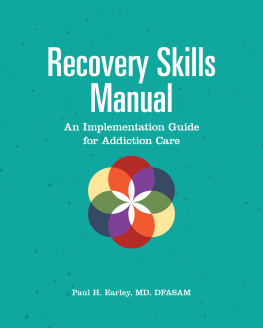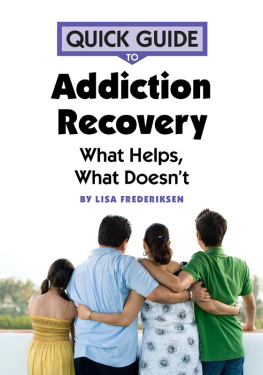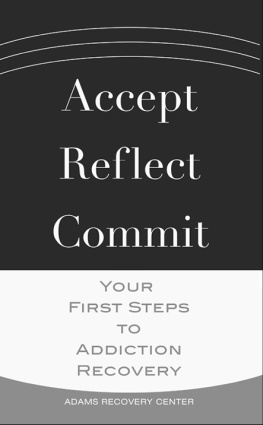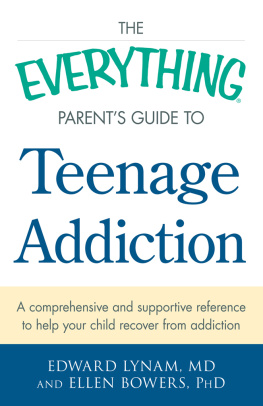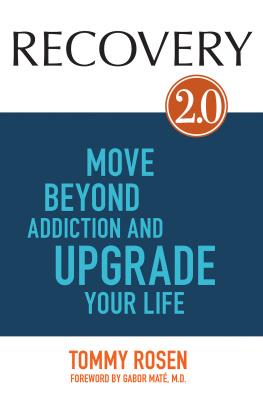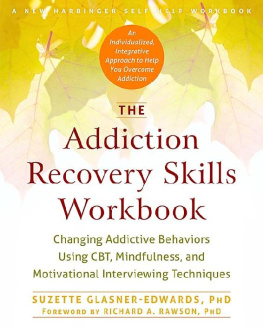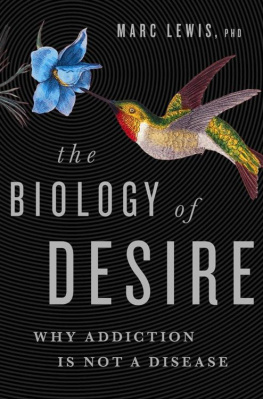Contents
Page List
Guide
Recovery Skills Manual
Recovery Skills Manual
An Implementation Guide for Addiction Care
Paul H. Earley

Central Recovery Press (CRP) is committed to publishing exceptional materials addressing addiction treatment, recovery, and behavioral healthcare topics.
For more information, visit www.centralrecoverypress.com.
2020 by Earley Consultancy, LLC
All rights reserved. Published 2020. Printed in the United States of America.
No part of this publication may be reproduced, stored in a retrieval system, or transmitted in any form or by any means, electronic, mechanical, photocopying, recording, or otherwise, without the written permission of the publisher.
Publisher: Central Recovery Press
3321 N. Buffalo Drive
Las Vegas, NV 89129
25 24 23 22 21 20 1 2 3 4 5
ISBN: 978-1-949481-36-5 (paper)
978-1-949481-37-2 (e-book)
Photo of Paul Earley by Eric Bern of Eric Bern Studio. Used with permission.
Every attempt has been made to contact copyright holders. If copyright holders have not been properly acknowledged please contact us. Central Recovery Press will be happy to rectify the omission in future printings of this book.
Publishers Note: This workbook is not an alternative to medical advice from your doctor or other professional healthcare provider. CRP books represent the experiences and opinions of their authors only. Every effort has been made to ensure that events, institutions, and statistics presented in our books as facts are accurate and up-to-date. To protect their privacy, the names of some of the people, places, and institutions in this workbook may have been changed.
Cover and interior design by Deb Tremper, Six Penny Graphics.
Contents
Welcome
This manual is a practical, step-by-step guide designed to help you implement RecoveryMind Training (RMT) in your outpatient practice (ASAM Level 1), IOP (Level 2.1), Partial Hospitalization (Level 2.5), or Residential program (Levels 3.1 to 3.7). It assumes you are already familiar with the basic concepts of RecoveryMind Training and can apply these concepts to the specific exercises this manual contains.
When you first introduce the techniques described here, its important to remain faithful to the principles from RecoveryMind Training (the text). They have been carefully developed by experts in the field to ensure that each patient has the highest probability of success. As you become more familiar with each of the modules, I encourage you to provide me with feedback on changes and modifications you think might be helpful, since RecoveryMind Training is an evolving model of comprehensive treatment.
Before we begin, perhaps we should discuss terminology. I will use the terms therapist and clinician to refer to the individuals providing care. RecoveryMind Training does not define the credentials that a caregiver must have for a given task. I leave this up to licensing agencies, your training, your knowledge base, and your skill set. I will also use several terms for the individuals receiving treatment, using patient or client most often. I mean no offense if you use other terms for the people you work with. In the same vein, I will use the term addiction most often when referring to the illness we treat rather than substance use disorder. The reasons for using this label are complex. To learn more, please refer to the companion volume, RecoveryMind Training.
With these thoughts in mind, I would like to welcome you to treatment in the twenty-first century!
About This Manual
RecoveryMind Training divides recovery skills into six domains. The RMT domains are:
Domain A: Containment
Domain B: Recovery Basics
Domain C: Emotional Resilience
Domain D: Internal Narrative
Domain E: Connectedness and Spirituality
Domain F: Relapse Prevention Skills
This manual assumes you have read RecoveryMind Training and understand the principles in that book before you use the tools contained in this manual. You may also benefit from attending a training on RecoveryMind Training before you start. Contact me at paulearley.net for more information.
Each domain contains a group of skills. A patient practices a skill (if so assigned) until he or she develops the skill as defined and tracked in the Progress Assessment Form for each domain. As patients learn and practice these skills, they literally rewire the brains neural pathways from the unconscious, reflexive addicted state (AddictBrain) to a balanced self-reflective state called RecoveryMind. Therapists who work in organized treatment use the following tools to structure the RecoveryMind Training process:
1. Assignment Groups
2. Skills Groups
3. Process Groups
4. Patient Worksheets
5. Progress Assessment Forms
Therapists in an outpatient practice may use groups as well, if so, they may use one or more of the group types 1, 2, and 3 above. If a therapist only works with clients individually, he or she fulfills more than one role, overseeing the work one minute and enrolling as an actor the next.
Studies point out that lecture-based training almost never modifies hardwired behaviors. Information is taught, but it is best followed by practice through role-play. Compare these two scenarios:
1. You tell your client, You should not spend time with friends who are drinking, especially if they are intoxicated.
2. You first tell your client, You should not spend time with friends who are drinking, especially if they are intoxicated. This is followed by, Your good friend Amy, who goes with you to that club you like What was its name? Yes, The Inferno. Stand up. I will play Amy. We are in The Inferno The therapist talks a bit louder, gently taps her clients shoulder and says in a slight drawl that mimics early intoxication, Oh come on have just one drink with me to celebrate. The client may correct the tone and delivery that Amy would adopt; if so the statement is repeated. Then the therapist falls out of role, subtly moves to one side a bit and asks, What did that feel like?
In the first case, your client learns a fact. In the second, he or she experiences the reality of that fact. Even if the role-play is quick and inaccurate, your client will experience a bit of the visceral experience of previous danger. You may choose to continue the role-play, having your client say, No I have decided that I cannot drink alcohol and furthermore, I should not be here. You may gently suggest he walks out the office door, shutting it firmly as he leaves.
If you have the luxury of working with many patients in a group setting, you probably already know how profound good therapy experiences can be for your clients. RecoveryMind Training asserts that skills that promote recovery are instilled through procedural learning (experiencing and moving) and not semantic memory (acquisition of facts).
RecoveryMind Training uses lectures sparingly; therapy most often occurs in Skills Groups where the leader provides a short orientation to the tasks of that group. The orientation may be followed by limited participant discussion. The central therapeutic mode in Skills Groups is role-play or interactive practice, using the techniques derived from psychodrama

